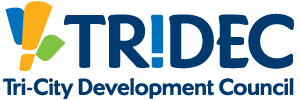22 Oct Vote No on Carbon Fee Initiative 1631
Over the weekend you should have received your ballot. This year there are five statewide measures on the ballot: I-940, I-1631, I-1634, I-1639 and Advisory Vote 19.
I wanted to take this opportunity to share my thoughts on Initiative 1631. If passed, this Initiative would make Washington State less competitive for business.
Recently, TRIDEC’s Board of Directors voted to oppose Initiative 1631, the carbon fee initiative. In doing so we join many other organizations such as the Association of Washington Business (AWB), Benton and Franklin PUDs, and the Pasco Chamber of Commerce in our opposition.
I-1631 would take effect in 2020 and adds a $15 per metric ton assessment on CO2. Annual increases of $2 plus inflation would be automatic, reaching approximately $43 in 2030.
TRIDEC opposes the initiative for several reasons.
As the lead economic development organization for the Tri-Cities, we are extremely concerned that being the first, and perhaps only, state in the nation to levy a tax on CO2 sends a strong message that Washington is unfriendly to business.
Representatives of a major US corporation recently indicated to TRIDEC that a Washington tax on CO2 would influence its future investment decisions. This tax would most certainly cause existing Washington companies and potential new companies to re-evaluate investment and job creation plans and would likely remove Washington from consideration on many projects.
Initiative 1631’s most noticeable impact would be at the gas pump causing an immediate 14-cent-a-gallon gas tax hike. The Washington Policy Center reports the Initiative would cost the average household between $234 and $305 in 2020, nearly tripling by 2030.
While households would see their energy costs go up, many businesses are exempted.
These include “trade exposed, energy dependent” industries including aircraft manufacturing and others that might be driven from the state by the added taxes. Agricultural and aviation fuels are also exempt.
TRIDEC is concerned about impacts on individuals and families, but we are also concerned about the impact the Initiative will have on freight movement because of increased fuel costs.
Washington is an important gateway to the Pacific Rim, but our State could lose out on warehousing and distribution jobs as these industries may choose to locate close to Washington without physically being in the State to avoid these costs.
For companies in Washington, the increased cost of transportation will likely be passed on to the consumer.
Washington State’s Office of Financial Management (OFM) estimates that Initiative 1631 would raise more than $610 million in new taxes the first year.
Decisions on how the money would be spent are left to a fifteen-member board. Except for the Commissioner of Public Lands, members of the board are appointed by the Governor and are not elected by the people.
In general, the funds would be used to improve air quality. However, the board is given wide latitude with little guidance or oversight on use of the funds. The Initiative does set targets for CO2 reductions, but ironically if the targets are missed there is no enforcement or oversight, taxes just continue to be collected and continue to increase annually.
TRIDEC believes that reducing the State’s carbon footprint is an admirable goal, but Washington already has one of lowest carbon footprints of any state in the nation.
The infinitesimal impact of this Initiative on reducing global carbon emissions is not worth the burden to Washingtonians or the damage it would do the State’s business climate.
We encourage you to Vote No on I-1631!
For Additional Information on I-1631:


